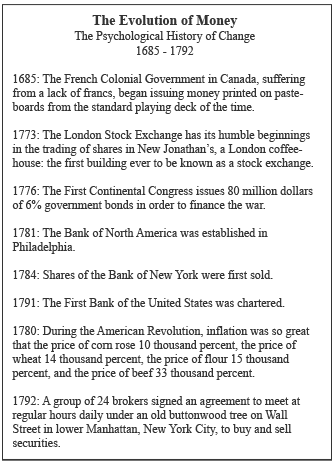 A SELECTIVE HISTORY OF OUR RELATIONSHIP WITH MONEY
A SELECTIVE HISTORY OF OUR RELATIONSHIP WITH MONEY
To truly understand the symbiotic connection between money and the mind, it is essential to know from whence it came and how it developed as an integral component of the human experience.
However, I am not going to delve too deeply here into a comprehensive history of the development commerce. Instead, allow me to present my interpretation of key milestones, highlighting what I feel are relevant psychological factors.
I am convinced the financial professional needs grounding in such historical/psychological relevance. It is not only the actual milestones that warrant recollection, but also what these momentous developments meant psychologically to our culture.
With each milestone, consider the impact on the collective consciousness. The evolution of commerce and banking was not only a product of the evolution of humanity, but it actually was the central facilitator for progress. It is an ugly, cruel history, marked by inhumanity, greed, exploitation, violence, death, and destruction.
 Nonetheless, it is our history. And, virtually every thread woven into this grand tapestry has in some manner; either directly or indirectly, influenced all of us today.
Nonetheless, it is our history. And, virtually every thread woven into this grand tapestry has in some manner; either directly or indirectly, influenced all of us today.
When considering each milestone I provide, think of the way in which these developments dramatically altered everyday life.
Money has always been the main engine for civilization’s growth and progress. Tracing the trajectory of world culture, banking practices originally began in Asia, extended into Europe and then to the Americas, Australia, Africa, and on to even the most remote countries of the world.
Development of cohesive societies varied greatly in different parts of the world, though they all had at least one common denominator—some form of money to facilitate commercial relationships. Now, let us explore some developments and ascertain the psychological ramifications.
Read Part Four of this 7 part series next week.
To contact Christopher Bayer directly, please email Christopher.Bayer@TheShareholderActivist.com.








